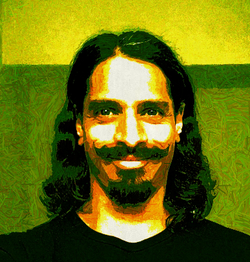This phrase refers to the animal instinct to either engage in confrontation or flee from danger. This is coded into the behavior of all animals. Pain serves the biological purpose of warning the host organism to cease destructive behavior. One of the most alluring facets of boxing for me has been learning to control one's instinct. It uses pain to condition the mind into learning how to change instinctive behavior.
"All that we are is the result of what we have thought: it is founded on our thoughts, it is made up of our thoughts. If a man speaks or acts with pure thought, happiness follows him, like a shadow that never leaves him."
― The Dhammapada, Verse 2
No matter how long a person spends training for a fight, nothing compares to the actual moments of climbing up into the altar-like ring for battle. I'm sure some Jungian archetype exists for this phenomena as our ancestors once experienced before war or a dangerous hunt. The misnamed ring is actually a square more like a semi-flexible cage. Each fighter stands like an animal in their corner, their team provides water, towels, advice, and encouragement from beyond the corner of the ring.
Each year, I like to compete in the Golden Gloves Boxing tournament. It reminds me of what's important and the vigilance necessary to stay in shape. The actual fight feels surreal like looking back at a blurry memory. I remember being present, but it was as if there was another spirit in my body. I usually prefer to start out slow, feel out my opponent's skill, and prod for weaknesses; however, this last time I was compelled to abandon strategy in preference to all out attack.
Before the competition, all fighters are required to meet with a doctor several hours before their fight. This requirement lends a lot of free time for each fighter to rest, relax, or get their minds into the proper frame. I typically read one of my favorite books. Its words offer profound comfort and insight especially in this heightened state of mind.
The weeks leading up to the competition require sacrifice and discipline in order for each fighter to get into shape and condition. It sort of reminds me of Lent, where those who practice it observe 40 days of sacrifice, fasting, and meditative prayer before the grand celebration of Easter.
Something that I'm reluctant to share with most fighters is that I actually detest hurting others. The allure of boxing for me has always been the thrill of out-foxing my opponent while evading danger. The other 364 days out of the year when I'm not competing, I can be found either in the library, cooking, dancing, riding my motorcycle, or maintaining my health.
In order to stay focused during training, I tend to isolate a single aspect of my boxing character and work on developing this trait. For me being the aggressor is difficult. I've developed myself as a counter puncher, or a defensive fighter who exploits the weaknesses of the attacker for tactical advantage. Training and sparring against friends is one thing; however, actually fighting a stranger is something else altogether.
The tournament takes place within the confines of sportsmanship, which includes spectators, referees, and judges. It becomes easy to lose focus while trying to impress others instead of fighting for oneself, as opposed to a street fight where one may be fighting for survival. For me, the enemy wasn't necessarily my opponent, but rather temptation itself. I was battling the temptation to quit or seek the path of least resistance. With each round moving along with the pace of a sprint, I found myself getting more and more drained of energy. I was beginning to feel weak. I maintained pressure and reminded myself that my opponent was also feeling the same thing. When the bell rang for the third round despite the ache in my muscles, I was able to dig deep within and finish strong. In the end, I took some punishment in the form of a mild concussion; yet amazingly it didn't stop me from returning fire and pushing my foe back against the ropes. My instinct had changed, I had overcome the temptation to succumb to the demon in spite of the shade cast by deafening blows. My reaction was to remain calm, recollect myself, and finish the fight.
Many people have asked how the fight went, to which I usually reply, "well". As I reflect on the season of lent, which usually follows these tournaments, I imagine Christ's own triumph over his fight with death. During lent Catholics often reflect on the "stations of the cross" which usually adorn the walls of the cathedral. "The Passion" of Jesus Christ refers to the short period of time where Jesus entered into Jerusalem after fasting forty days and resisting temptation in the desert. Upon his entrance into Jerusalem, Christ was arrested, tortured, and sentenced to death by crucifixion.
"Then they spat in his face and struck him with their fists"
― Matthew 26:67
After being beaten and scoffed at by the soldiers, Christ is sentenced to death by the state official, Pontius Pilate, at the behest of the powerful Sanhedrin. The stations depict Christ as he is forced into humiliation by dragging a heavy wooden cross to his own crucifixion. The soldiers mocked Christ, "the so-called King", and crowned him with a wreath of thorns instead of a Golden Coronation.
Jesus must have been in incredible condition to have sustained torturous punishment and still maintained the strength to carry the heavy cross. Jesus' loved ones and disciples watched helplessly as he marched. When he fell the first time, they came to his corner for support. Jesus sees his mother, and a woman named Veronica, who wipes his face and gives him something to drink. Simon of Cyrene, helps to carry the cross after Christ falls again. The majority of on-lookers are ignorant spectators looking for simple entertainment. Finally, after reaching the top of the hill, Christ is nailed to the cross and hung to die on Golgotha (the Mount of the Skull) along side thieves and criminals.
The metaphors found in this story are incredible. From a biblical perspective, mountains are usually referenced whenever God and man communicate, such as when Moses received the ten commandments. Some of the disciples went up to pray on a mountain and witnessed the luminous transfiguration of Jesus and saw him converse with Moses and Elijah. Later on, Jesus delivers his first gospel to the masses, which becomes known as the sermon on the mount. The defining moment of the Christian faith is when Christ rises from the dead on Easter morning, the third day after his death on the mount of the Skull.
I believe that it is here where God reveals something incredibly profound to mankind. People were expecting a savior in the form of a champion-king who would vanquish opponents the way an earthly warrior might do so; however, time and time again God's plans are often the opposite of what man thinks.
"Homo proponit, sed Deus disponit" (Man proposes, but God Disposes)
―Thomas a Kempis
God is clearly telling us to suspend our disbelief for just a moment and to be open to something more than our minds can comprehend... Death can be defeated.
We are in the midst of something immeasurable and we don't even know it. Jesus was laid to rest in a guarded tomb as his death sparked much controversy and the authorities wanted to make sure his prophecy of resurrection was not a ruse. On Sunday morning, some disciples went to the tomb to discover the guards frozen in shock by an angel who appeared like a ghost from heaven who rolled away the stone and exclaimed that Jesus has risen and is no longer entombed.
Sometimes it's easy to forget that we are destined for greatness when we lose perspective of what's important. This world is constantly telling us that we're not good enough, that in order to be accepted we must indulge our egos, that earthly pleasures are all that we deserve, when God the Father has already shown us that we are loved, forgiven, and invited just as we are. We get to choose if we want to be with Him in his Divine Kingdom. So now our final conflict is one of animal instinct or of human free will.
"Greater in battle than the man who would conquer a thousand by a thousand men, is he who would conquer just one — himself."
― The Dhammapada, Verse 103




 RSS Feed
RSS Feed
